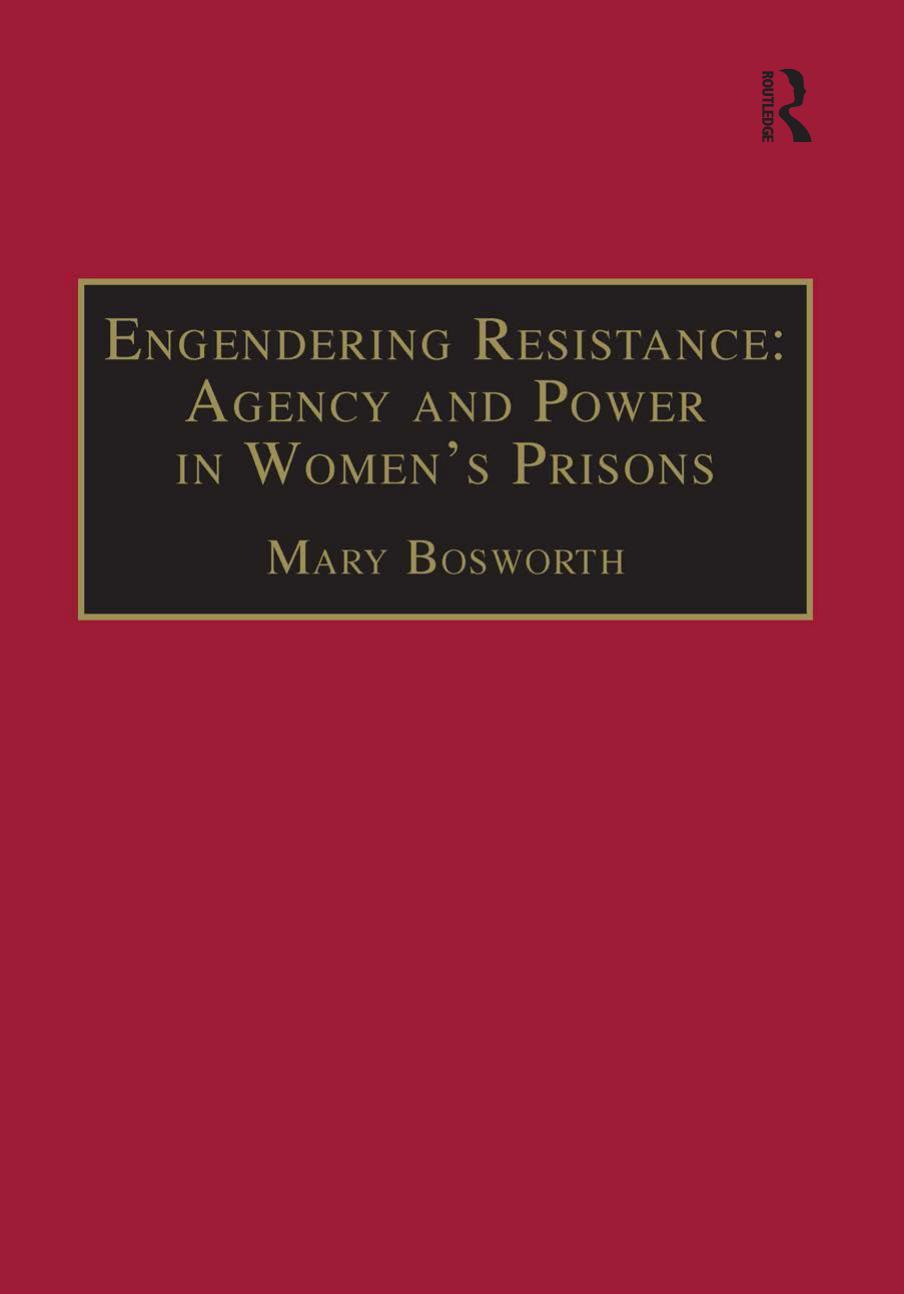Engendering Resistance: Agency and Power in Women's Prisons by Mary Bosworth

Author:Mary Bosworth [Bosworth, Mary]
Language: eng
Format: epub, pdf
ISBN: 9781138275263
Barnesnoble:
Publisher: Taylor & Francis
Published: 2016-11-11T00:00:00+00:00
4 Gender, Identity and the Prison: Punishing Their Bodies, Punishing Their Selves
Identity does not refer to my potential for choice alone, but to the actuality of my choices, namely to show how I as a finite, concrete, embodied individual, shape and fashion the circumstances of my birth and family, linguistic cultural and gender identity into a coherent narrative that stands as my life story. (Benhabib 1987: 89)
The notion of identity refers us to certain evaluations which are essential because they are the indispensable horizon or foundation out of which we reflect and evaluate as persons. To lose this horizon, or not to have found it, is indeed a terrifying experience of disaggregation and loss. (Taylor 1985a: 35)
Donât look at what Iâve done, look at who I am. (Dorothy: HMP/YOI Drake Hall, June, 1995)
A discussion of âidentity politicsâ has recently emerged in many academic circles as a new way of conceptualizing power relations (Benhabib 1992; I. M.Young 1990; Calhoun 1994; Gutman 1994; Taylor 1989, 1994; Braidotti 1994; Griffiths 1995; Weir 1996). In this literature, issues of âidentityâ and âsubjectivityâ are promoted as a critique of power relations through an appreciation of previously marginalized groups and experiences. This chapter will explore how such literature can be utilized to enhance an understanding of how power is negotiated in womenâs prisons by drawing attention to the ways in which women evaluate imprisonment in terms of their lived experiences of race, class and gender. As Chapter 2 demonstrated, womenâs actions and needs are usually already interpreted according to a restrictive notion of femininity. Without a more detailed awareness of the various constitutive elements of their identity, it is difficult to establish how prisoners evaluate their experiences of imprisonment and why they comply with or resist the regime. It is not possible to comprehend the choices they have nor understand the reasons they give for the choices they make. Without knowing âwhoâ the prisoners are â in a deep, sociological sense â it is difficult to differentiate between inmate groups and to identify the effects of power.
Since the decline of Marxist thought in the late 1980s and early 1990s, scholars have been searching for new ways to theorize power relations (Laclau and Mouffe 1985; Laclau 1990; Fraser 1997). Previous representations of âpowerâ as distributed in hierarchical structures â whether they are perceived as Marxian classes or Weberian bureaucracies â have been progressively rejected in favour of viewing âpowerâ as relational and subject to change.1 In particular, recent developments in feminist, communitarian and critical theory have placed the related issues of âidentityâ and âsubjectivityâ at the centre of a new conceptualization of power relations. In this chapter and the next, I shall use examples from the women in prison to discuss the implications of such literature for prison studies. By outlining womenâs descriptions of their sense of self, this chapter will demonstrate that much of the framework of prisonersâ evaluation is derived from commonplace assumptions embedded in their lives outside, and that the women enter prison with a conceptual apparatus shaped by their class, race and gender.
Download
Engendering Resistance: Agency and Power in Women's Prisons by Mary Bosworth.pdf
This site does not store any files on its server. We only index and link to content provided by other sites. Please contact the content providers to delete copyright contents if any and email us, we'll remove relevant links or contents immediately.
The 1921 Tulsa Race Massacre by Chris M. Messer(335)
Introduction to Criminal Justice - A Balanced Approach by Brian K. Payne Willard M. Oliver Nancy E. Marion(287)
Punishing the Poor The Neoliberal Government of Social Insecurity by Unknown(263)
Russia's Sakhalin Penal Colony, 1849â1917 by Andrew A. Gentes(259)
The History of Newgate Prison by Jowett Caroline;(247)
Serial Killers America and UK - 2 BOOKS IN 1 by Clark Matthew(234)
A History of Police and Masculinities, 1700-2010 by David G. Barrie Susan Broomhall(207)
Restorative Justice in Transitional Settings by Kerry Clamp(190)
Culture, Crime and Punishment by Ronald Kramer(178)
Cops, Cameras, and Crisis by Michael D. White Aili Malm(171)
Dangerousness, Risk and the Governance of Serious Sexual and Violent Offenders by Karen Harrison(169)
The Real CSI by Kate Bendelow(166)
Organized Crime and Corruption Across Borders by T. Wing Lo Dina Siegel Sharon I Kwok(166)
Routledge Handbook on Immigration and Crime by Holly Ventura Miller Anthony Peguero(164)
Policing Gender, Class And Family In Britain, 1800-1945 by Linda Mahood(161)
Women Exiting Prison by Bree Carlton Marie Segrave(160)
Using Murder by Philip Jenkins(156)
Losing Legitimacy by Gary Lafree(150)
A Theory of African American Offending by James D. Unnever Shaun L. Gabbidon(148)
